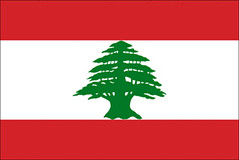
Let's be blunt here. I don't know squat about Lebanon. But recent events -- the gory assassination of a former Prime Minister, bluster from the Bush administration and most European countries that Syria should withdraw its troops from the country, Lebanese people demonstrating against Syria in the capitol -- all this tells me that if I want to preserve my self image as a serious, critical consumer of news, I've got to invent a quick crash course on Lebanon.
So here are a few steps I've come up with. I hope others will add additional ideas in the comments.
1. I've written my Lebanese friend in Beirut. Yes, I am ahead of most folks in the USofA because I have such a friend. I've known her for over 20 years since I interviewed her when she was in the US as a refugee from the Lebanese civil war and the Israeli invasion of 1982. But I have NOT asked her to explain the political situation to me. First off, I don't think I have the background to understand what she'd be likely to tell me. And more important, I've learned not to question folks living in insecure countries about politics. They are the experts on what is safe for them to say. If they volunteer political commentary, then I get it. If they are silent, they may well be smart. (I got an answer from my friend with some vague condemnation of both Hairiri and Syria, but I don't have the background to understand her cryptic comments.)
2. I've tried to remember what I've read about Lebanon. I seem to have two relevant books in the house, both way out of date. The fact that I have kept them means I thought they were pretty good when I read them.
Tabitha Petran, The Struggle over Lebanon seems to be a Marxist history of wars in Lebanon from the colonial period through the mid-80s. Feels dated.
Robert Fisk, Pity the Nation , most recently reissued in 2002. I read this just last year and cannot recommend it too highly. Fisk hates war and brutality and he has seen a lot of it. He writes a panoramic account of modern Lebanese history, including very few heroes and a lot of villains. I look it over quickly to remind myself of the contents, knowing that it is almost 700 dense pages.
3. Now I'm ready for the news accounts. As a general rule, I don't trust the US mainstream media about anything that happens outside the US. This isn't 100 percent justified, but the exceptions are few. So I go first to foreign sources, then work back to the US ones. On Lebanon, I started with the BBC. They seemed to be cheerleading for the demonstrators in Martyrs Square, fitting the whole thing into the same frame as recent events in Ukraine. That doesn't feel trustworthy. When news about an unfamiliar place feels completely familiar, I assume that the purveyors of the news are forcing events into their own familiar preconceptions. Sometimes that may be right, but usually it obscures more than it reveals.
4. And so, it is on to web-based commentators, some blogs, some more formal. I already have a few places to start looking because the same sites that comment on Iraq developments seem ready to claim knowledge of Lebanon.
Juan Cole has a long Lebanon post. I know it is not his area of specialization (that's matters Shi'ite) but it is a start.
Just World News by Helena Cobban who lived in Lebanon is carefully not trying to read more into the situation than she knows.
Jonathan Edelstein has taken on the truly gargantuan task of offering 'Lebanese Politics for Beginners', here, here and and here.
The comments on these point to other possible sources and competing perspectives.
A round of this now I'm ready to go back to the mainstream media, British and US, and try to follow developments.
So this is the order I use to try to meet the challenge of understanding a completely new place/development in the news.
1. Friends
2. Books already read
3. Mainstream foreign media
4. Web commentary
5. Mainstream media in the US
There is something to be learned from all of them -- and I still don't know squat about Lebanon. But it looks like I'll have to try if I am to be informed.
UPDATE: Sunday, March 6, 2005: Today's Lebanon headline from the BBC is Syria pullback 'to start Monday. Today's Lebanon headline in my local paper's print edition "Syrian leader rejects troop pullout." Lebanon resides in the eye of the beholder, but at least I have some resources for sorting it out.
1 comment:
By far the most interesting news I'm finding about Lebanon today is from Joshua Landis' blog Syria Comment. Landis is an American academic, currently in Syria with Syrian family. The comments on his blog include a lively conversation among Syrian, Lebanese and US people.
Post a Comment